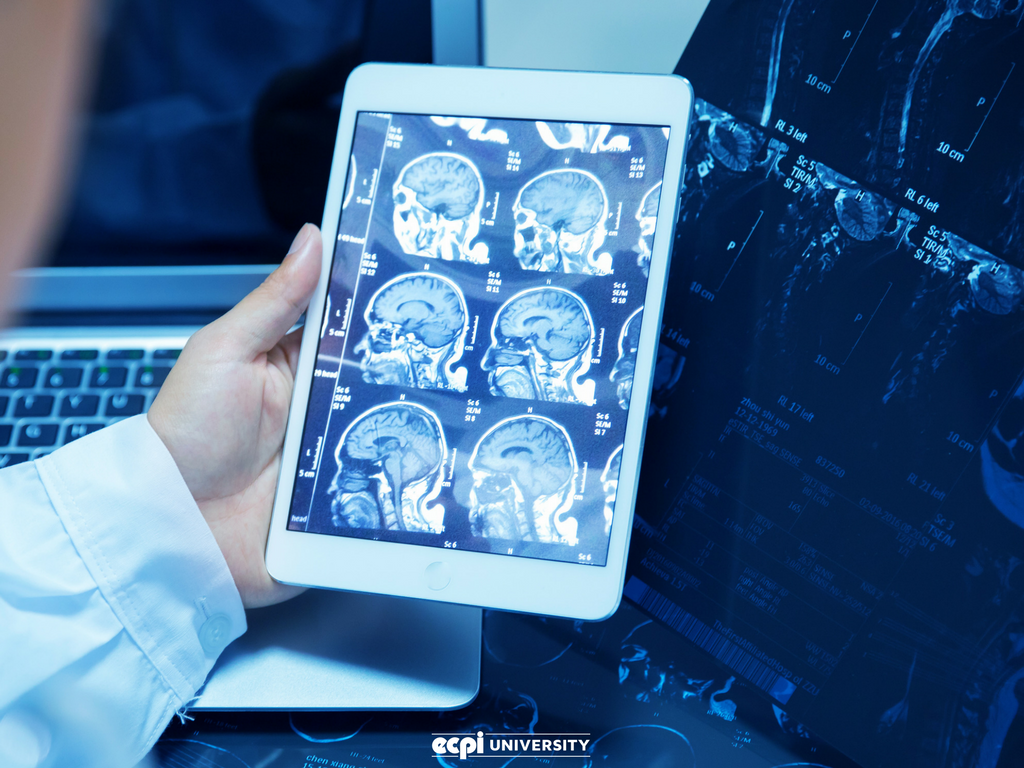Radiologic Sciences and Patient Care: What Will You Learn?
Compassion is key when it comes to dealing with radiology patients. Radiology students must, of course, learn how to conduct and evaluate diagnostic imaging examinations, but how does the student develop the softer skills involved with patient care?
Radiology programs also help students develop superior communication skills, critical thinking, and problem solving. Quite often, the courses that will help students prepare for this aspect of the job are found in the curriculum for the bachelor degree.
Radiologic Science Basics
When you embark on your academic journey to become a radiology technologist, you will study the basics first. Generally, earning an associate degree in radiologic sciences could develop your skills in the following:
- Biology
- Operation of equipment
- Film/screen techniques
- Digital and computer radiology
- Image production, evaluation, processing
- Radiographic procedures (anatomy, positioning)
- Patient transfer and assistance
As you master the technical aspects of your job, you should also be developing the communication and personal skills needed for patient care. Every radiologic technologist needs to be aware of legal and ethical issues pertaining to the profession. Sensitivity to the issues of infection, as well as how to respond in an emergency, should likewise be developed.
What Should a Bachelor's Degree in Radiologic Sciences Teach You?
Pursuing a bachelor’s degree in radiologic studies could not only increase the student's technical knowledge of the field, but could also offer continued help in developing patient care skills. Courses are likely to include psychology, communications, culture and diversity, business administration, law and ethics in radiology, how to be an effective radiology supervisor, and advanced patient assessments and treatments, among other advanced courses. The most successful students will mine these courses for a better understanding of how the patient feels, understanding that compassionate care can often affect patient outcomes.
Compassion Is No. 1
Quite often, patients who are seeking MRIs or other diagnostic imaging examinations are dealing with fear and are concerned about a possibly poor outcome. Although the interaction with the radiologic professional is fleeting, it can be significant for good mental health when the patient is treated compassionately. This is particularly true in radiology, where so much emphasis in recent years has been placed on the images and technology, and much less on dealing with the patients.
It is well known that compassionate care helps develop trust between the healthcare practitioner and the patient, and in turn facilitates communication. This can also help contribute to the patient's chances for recovery. For instance, some of the small things a radiologist might do for a patient include the following:
- Smiling at the patient
- Taking the patient's hands
- Listening to the patient while making eye contact
- Not displaying a rushed demeanor
Diminishing the Fear Factor
Diminishing fear for radiology patients should be the goal of every radiologic technologist. From the moment the patient enters the office, throughout the procedure, and during follow-up, it's important to try to help allay fears by being accessible and available to answer all questions. Better communication can actually diminish the scariness of the experience.
For instance, a radiologic technologist might include a phone number and email address at the bottom of the radiology report, so that patients can call directly. Some modern healthcare facilities have focused on drawing patients in as partners in their own healthcare by having them serve on committees and give feedback on providing more patient-friendly environments.
Patient Safety
As imaging equipment has grown more accurate, and the imaging process has sped up, modalities have been introduced, lowering patient exposure to radiation. Communication of all these factors to patients is important to patients, helping them to understand the process better, and to have greater confidence in the imaging. Part of the radiologic technician's role may be to quiet fears about exposure to radiation.
Technicians can alleviate patient fears by explaining that they conduct all imaging with concern for patient dose, and follow ALARA (as low as reasonably achievable) procedures, mindful of a balance between safety and image quality. Technologists, who often are the only healthcare professional that the patient encounters during the imaging process, have an added responsibility: to monitor when a physician might inadvertently order an imaging procedure that duplicates one recently undergone, or one that might not be appropriate for other reasons. For that reason, technologists should seek a component in their baccalaureate studies that provides them with a thorough understanding of radiation safety, so that they can provide adequate assurance to patients of the imaging procedures' safety.
Are you interested in furthering your radiological education? If you already hold an associates degree in radiology, and you want to earn a Bachelor of Science in Radiological Sciences, consider ECPI University for your education. For more information, connect with a helpful admissions advisor today.
It could be the Best Decision You Ever Make!
DISCLAIMER – ECPI University makes no claim, warranty, or guarantee as to actual employability or earning potential to current, past or future students or graduates of any educational program we offer. The ECPI University website is published for informational purposes only. Every effort is made to ensure the accuracy of information contained on the ECPI.edu domain; however, no warranty of accuracy is made. No contractual rights, either expressed or implied, are created by its content.
For more information about ECPI University or any of our programs click here: http://www.ecpi.edu/ or http://ow.ly/Ca1ya.





